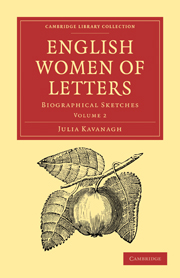Summary
Of all the women who have written, Mrs. Opie is the one who succeeded most by qualities distinct from those generally called literary, or, better still, intellectual. She was not much of a thinker, still less of a writer. Her style is careless, and often incorrect; her pictures of life are not such as we can value. Strong character she neither conceived nor painted. Yet she succeeded in an age where men and women, far beyond her in power and attainments, might have made the public fastidious; and that success, a matter of fact, not of assertion, entitles her to consideration. Great though her deficiencies were, it was merited. Mrs. Opie had but one gift—a great one, a beautiful one, a woman's gift—a gift which won and ruled hearts amenable to no other power; better than any in her generation she knew how to appeal to the heart. Her first novel, her best, reminds us forcibly of the reason the French sculptor, David, gave for wishing to take her medallion, when, many years after its appearance, she visited Paris in Quakeress attire; he wished it, he naïvely said, “because she had so often made him cry.” In “Father and Daughter,” even more than in her later tales, Mrs. Opie displayed a power in which she was unrivalled, even by her friend, Mrs. Inchbald: a tenderness, a command over the reader's feelings, a simple and natural pathos, not rising to sublimity, as it does in great geniuses, but ever sweet and true—the pathos of everyday life, made to come home to every heart.
- Type
- Chapter
- Information
- English Women of LettersBiographical Sketches, pp. 268 - 284Publisher: Cambridge University PressPrint publication year: 2010First published in: 1863

